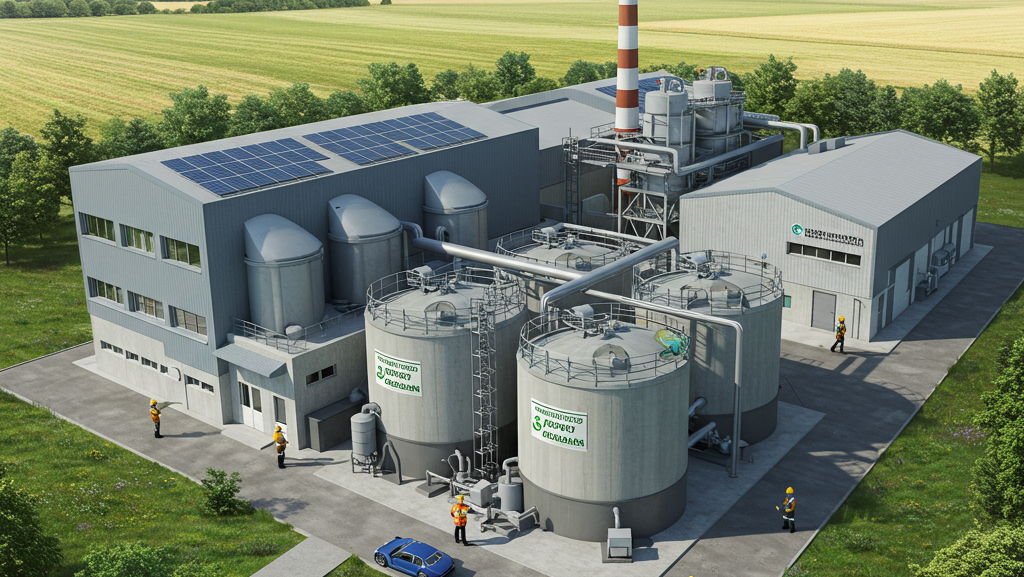Sustainable Farming Practices
Mupundu Energy has made significant strides in promoting sustainable farming practices in Zambia, underscoring its commitment to environmentally friendly agricultural techniques. By integrating renewable energy sources with organic farming methods, the organization not only enhances agricultural productivity but also places a strong emphasis on minimizing environmental impact. This innovative approach exemplifies a shift towards more sustainable agriculture, aligning with global goals of ecological preservation.
One of the standout initiatives of Mupundu Energy is its focus on large-scale farming practices that leverage advanced renewable energy solutions. This integration allows farmers to harness solar and biogas energy, significantly reducing reliance on fossil fuels. The use of renewable energy in farming operations contributes to lower carbon emissions and a reduced ecological footprint. Moreover, it empowers local farmers by providing them with reliable energy sources that can be utilized for irrigation, greenhouse heating, and other essential agricultural activities.
Additionally, Mupundu Energy emphasizes the use of organic fertilizers derived from the anaerobic digestion (AD) process. This innovative fertilizer not only enriches the soil with essential nutrients but also recycles waste by converting agricultural residues into valuable inputs for farming. By using organic fertilizers, farmers can achieve healthier crop yields while decreasing the need for synthetic chemicals, which often have detrimental effects on the environment and human health.
Through these initiatives, Mupundu Energy is not only tackling the challenges of food security but is also ensuring that farming practices are sustainable for future generations. The organization’s commitment to combining renewable energy with organic farming stands as a model for how agricultural practices can be transformed to be more sustainable, efficient, and environmentally responsible.
Environmental Benefits
Mupundu Energy’s sustainable farming practices have been instrumental in enhancing the environmental landscape. At the forefront of these initiatives is the focus on soil health, an essential component for productive farming. By employing techniques such as crop rotation, cover cropping, and organic fertilization, Mupundu Energy not only maintains soil fertility but also actively reduces soil erosion. Healthy soil is rich in organic matter and nutrients, promoting robust plant growth and, consequently, increasing agricultural yield over time.
Moreover, the contribution of Mupundu Energy to biodiversity cannot be overstated. Diverse farming practices create a variety of habitats for numerous species, fostering a balanced ecosystem. The introduction of native plants and maintaining areas of natural vegetation allow for improved pollination rates and support beneficial insects. These practices ensure a thriving biodiversity, which is vital for the resilience of the agricultural environment. By supporting a diverse set of crops and trees, Mupundu Energy plays an essential role in integrating nature with agriculture, thus promoting a sustainable model for future farming.
Another notable environmental benefit of these practices is the potential for carbon sequestration. Effective soil management techniques can trap atmospheric carbon dioxide in the soil, mitigating some impacts of climate change. By increasing the organic carbon content in the soil, these practices not only offset carbon emissions but also improve soil structure and water retention. This synergistic effect aids farmers in adapting to changing climate conditions, making their operations more sustainable in the long term. In essence, Mupundu Energy’s commitment to sustainable farming is not just beneficial for the immediate agricultural community but also plays a pivotal role in preserving the environment for future generations.
Economic and Social Impact
Mupundu Energy’s farming initiatives epitomize a multifaceted approach to enhancing economic and social well-being within local communities. By engaging in large-scale farming and biogas production, the organization plays a crucial role in job creation, which is essential for combating unemployment rates in rural areas. As Mupundu expands its farming operations, it fosters a range of employment opportunities across various sectors, from agriculture to logistics. This not only elevates household incomes but also stimulates local economies, leading to a multiplier effect that benefits other peripheral businesses.
Furthermore, Mupundu’s commitment to sustainable agricultural practices promotes food security within these communities. By increasing the availability of locally produced food, the organization not only reduces dependence on imported goods but also contributes to healthier diets and improved nutrition among residents. Access to reliable food sources shapes a resilient community, less susceptible to fluctuations in global markets and weather-related disruptions.
The social dimension of these initiatives cannot be overlooked. Mupundu Energy actively invests in community development projects that enhance local infrastructure, such as roads, clinics, and schools. These improvements bolster the quality of life and facilitate better access to essential services, fostering a sense of community pride and cooperation. Moreover, the production of biogas serves as a sustainable energy solution that replaces harmful fossil fuels and offers cleaner cooking alternatives. This transition directly translates to improved air quality, healthier living conditions, reduced deforestation for fuel, and, ultimately, a more sustainable environment.
Overall, the comprehensive economic and social impacts of Mupundu Energy’s farming initiatives signal a profound transformation within rural communities, laying the groundwork for sustained growth and development. By creating jobs, enhancing food security, improving infrastructure, and providing access to clean energy, Mupundu is a catalyst for positive change that underscores the holistic benefits of integrating agriculture and energy solutions.
Education and Training Programs
Mupundu Energy is deeply committed to empowering local farmers through comprehensive education and training programs focused on sustainable agricultural practices. These initiatives are designed not only to inform farmers about modern techniques but also to instill a strong understanding of the benefits derived from the integration of sustainability into their farming operations. By offering workshops and seminars, Mupundu Energy aims to equip farmers with the necessary knowledge to optimize their output while minimizing environmental impact.
One of the cornerstone offerings of Mupundu Energy’s educational initiatives is the series of workshops dedicated to sustainable farming methods. These sessions cover various topics, including crop rotation, organic farming, soil health improvement, and water conservation techniques. Farmers are encouraged to participate actively, sharing experiences and learning from one another. This collaborative atmosphere helps foster a community focused on sustainable growth, thereby enhancing the overall agricultural landscape in the region.
In addition to traditional workshops, Mupundu Energy emphasizes the importance of hands-on training. Practical training sessions allow farmers to directly implement new techniques under the guidance of experienced facilitators. This approach ensures that the concepts discussed in workshops are not merely theoretical but can be applied practically to improve crop yields and farm efficiency. Furthermore, special focus is given to educating farmers about the benefits of biogas production, highlighting how it can serve as an alternative energy source while enhancing waste management practices on farms.
Through these dedicated education and training programs, Mupundu Energy is playing a crucial role in transforming local agricultural practices. By empowering farmers with sustainable knowledge and skills, the organization is not only improving individual livelihoods but is also contributing to broader environmental sustainability efforts in the region. The ongoing commitment to education reflects Mupundu Energy’s belief in the potential of empowered farming communities to drive positive change.





